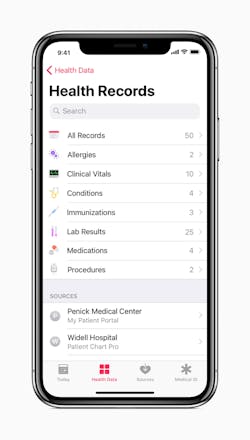Health IT observers surely raised their eyebrows upon seeing last week’s comments from CNBC’s Jim Cramer on why Apple should acquire EHR (electronic health record) giant Epic Systems.
Cramer, the host of Mad Money, noted that while Apple is the greatest consumer products company on earth, it has a growing problem on its hands. “As much as we might love the service revenue stream created by all these apps, including the healthcare ones, most investors treat Apple like it's some kind of hardware company ...on the verge of becoming obsolete,” said Cramer, as transcribed in a Jan. 15 CNBC report.
Cramer continued by noting that the issue stems from the iPhone. In 2018, he explained, iPhone sales accounted for 63 percent of Apple's revenue, “so the moment they started to decline, investors wrote the company off.” But because of the company’s lofty goals of becoming a bigger force in healthcare, and with an installed base of 1.4 billion users, an acquisition in the software space makes sense, Cramer argued.
Then came the bombshell: "Apple should acquire Epic Systems,” Cramer said. "Not only would this deal be good for the company, I think it's exactly what Apple's stock needs to get its mojo back."
He went on to make a few key points as to why this idea makes sense for both parties—the tech giant Apple and the Verona, Wis.-based Epic Systems, which holds roughly one-quarter of the U.S. acute care hospital EHR market share:
Ø Due to Apple’s Health Records initiative—launched about a year ago and which enables consumers to see their medical records right on their iPhone—that has some 200 hospitals, health systems and clinics on board already, information blocking could cease to exist since the iPhone and Apple could potentially “act as a universal repository” for a massive amount of health data.
Ø Because Epic is a privately held company that has never made an acquisition, Cramer believes it would be easier for Apple to integrate than a vendor like Cerner.
Ø Epic’s founder and CEO Judy Faulkner is now 75 years old, and despite going on the record to say she will never make the company public, Cramer feels that the business will inevitably scale, and that it’s better “to have the privacy-conscious Apple control millions of health records than other tech giants.”
After reading Cramer’s remarks, I reached out to a few industry sources who I knew would be interested in speaking about the possibility—or lack thereof—that this acquisition could actually happen. Two senior executives from ST Advisors, a strategic and financial advisory firm focused on healthcare IT, believe that while “you can never say never,” it’s extremely far-fetched, for a multitude of reasons, that an Apple-Epic merger would transpire.
Michelle Mattson-Hamilton, associate principal at the firm, which intensely analyzes healthcare and healthcare IT M&A, says that because Apple is first and foremost a consumer brand, “everything they do and offer is focused [primarily] on the consumer.” Epic, meanwhile, is an enterprise software company—"the epitome of enterprise software,” as Mattson-Hamilton puts it. “The culture would not fit; trying to mesh those two organizations together would be a complete disaster,” she attests.
Would Apple Even Be Interested?
One of Cramer’s arguments was that the iPhone and Apple—via its new Health Records feature—could act as a centralized bank for a patient’s health information. To this point, I recall a conversation I had with Micky Tripathi, Ph.D., president and CEO of the Massachusetts eHealth Collaborative, about a year-and-a-half ago regarding Apple potentially making the iPhone as a one-stop-shop for a patient’s health information.
Tripathi said at the time that Apple could be keying in on the patient-centric angle of interoperability, with the idea being that healthcare is currently provider-centric, meaning patients are under the assumption that wherever they go for care, their provider will have access to their whole health history. But in a patient-centric environment, they are the ones who take control. “And we see that now at times too, with people taking their CD and bringing it to the next site of care, because the imaging [reports] don’t get there otherwise,” he said.
But then Tripathi stopped short, importantly pointing out a big challenge: the lack of a real ecosystem that would allow patient-motivated health data exchange to happen. “What’s the organization that can help mobilize patients and help [ensure] scalable trust in a way so that patients can easily access their data from [two health systems], for example?” he asked at the time.
Potentially, as Cramer would advocate for, this is where Apple could enter their mix. But there still remains serious doubt if Apple would even want to own an EHR company, when in theory it doesn’t need to spend billions (the CNBC report noted that while Epic's market capitalization isn't public, the publicly traded Cerner has a market value of nearly $18 billion) when it could build API integrations that would allow developers to create apps that use data from patients’ EHRs. In theory, this would be far less costly than buying Epic.
Put more simply, Apple becoming this “enterprise-oriented” feels like a stretch. “If Apple did move into this space, wouldn’t it make more sense to look them into fitness coaching, health bots, or telemedicine?” asks Mattson-Hamilton. “There are many other logical things, and even illogical adjacencies, from where they are today than where enterprise EHR software would be.”
And in more recent comments to Healthcare Informatics, Tripathi also questions why Apple “would take the risk of running a highly complex operational ecosystem built on someone else's technology.” He further asks, “Why would they undermine their core value proposition of not having access to private individual information?”
Ben Rooks, the founder and CEO of St Advisors, adds, “Apple is a business that sells hardware and software to consumers and users, so going from that to selling hard-to-sell products in the most complicated industry—[healthcare] is the biggest sector and economy in the history of the world—well, I think Apple is smart enough to not get involved.”
Would Epic Ever Sell?
Another key consideration at the top of any Apple-Epic discussion is Epic’s desire to sell—now, or ever. The CNBC report importantly pointed out that Faulkner has apparently “created a charitable foundation to take over nearly all of her shares in Epic when her time as CEO is finished.”
Rooks recalls when former GE (General Electric) CEO Jeffery Immelt once approached Faulkner about purchasing Epic—a meeting that lasted all of five minutes. And still today, Epic doesn’t seem to have any desire to sell. On the 2018 Healthcare Informatics 100, a list that ranks the top health IT companies by revenues each year, Epic self-reported $2.7 billion in revenue for the 2017 fiscal year.
As Rooks and Mattson-Hamilton contend, Epic’s thriving business model—coupled with a lack of significant competition in terms of the number of major EHR vendors in this space—puts the company in a high-leverage position.
“I always say the best thing to ever happen to [Faulkner] was meaningful use, and the second best thing was that its biggest competitor [at the time] IDX was acquired by GE Healthcare [in 2005],” says Rooks, who also scoffs at Cramer’s point that healthcare’s information blocking issue would serve as any real motivation for an EHR vendor such as Epic to leave the industry. “That’s grasping at straws,” he asserts. “Maybe data blocking has plagued the customers and consumers, but if you are Epic or Cerner, information blocking is beneficial to your business model.”
Speaking to the idea of a tech company coming into EHR space more broadly, Rooks asserts, “No one has been able to make it work. Has there been a single tech company that has come into healthcare and been successful? It’s a long list, and they typically come in and leave with their tail between their legs three to five years later,” he says.
And Faulkner, despite turning 75 last August, doesn’t seem to be in any rush to exit. In an exclusive profile of the company by our Editor-in-Chief Mark Hagland in 2017, it was apparent that Faulkner, who was interviewed for the piece, takes great pride and purpose in being able to continuously evolve and innovate in a rapidly changing healthcare market.
So Rooks contends that if there was an option not to sell, that’s the route that Faulkner would take. “She doesn’t need the money and doesn’t need to leave [any more] of a legacy. I just can’t imagine it.” Tripathi agrees; “Why would Epic abandon their customers to a vendor with no experience or domain knowledge in large-scale healthcare delivery environments?” he asks. “This doesn't stand up to even the simplest business analysis.”



